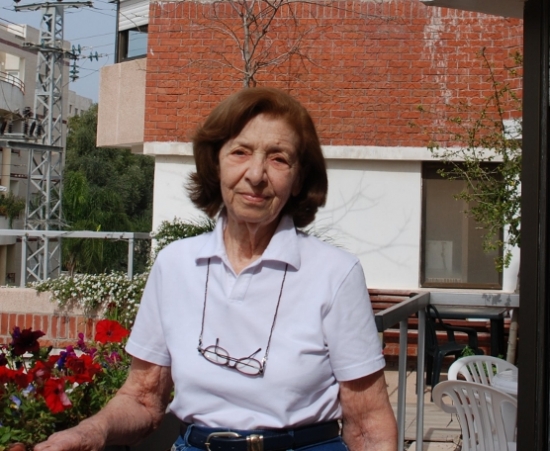
The sweet, heady scent comes wafting in from the orange groves flooding the senses and filling the air with its magic. That heavy clinging perfume evokes a haunting nostalgia for seasons past but mainly it carries with it a joyous release from dark wintry days and brings the promise of golden oranges and sunny days to come.
Then, as the first winds of May scatter the last of the little white orange blossoms with their fading perfume, nature compensates. Suddenly it is strawberry time! The slowly ripening strawberries erupt from under their plastic protection and splash their bright red excitement across the country.
The spring of 1967 followed the same master plan but that year the mood was different. It was one of anxiety and fear. The enemy was rallying on our borders and the tension was almost palpable. Something was going to happen and the whole country was waiting. And in those weeks of tense waiting we breathed the intoxicating perfume from the orange groves, but what promise for the future it carried in its fragrance we did not know. And when the strawberries exploded around us, the bright splashes of red seemed almost ominous and full of foreboding.
With the start of the season, as though she were a part of the unfolding pattern of nature, there was the strawberry woman going on her rounds once more - a symbol of continuity and normalcy in abnormal times. A slight, grey-haired woman in a faded print dress with a basket of strawberries.
Her old brown shoes with the worn leather a paler shade where they had stretched across large bunions seemed to have a volition of their own and carried her along at an even pace. First one then the other stepped ahead and propelled her forward with an automatic rhythm as though they could keep up that steady trudge forever.
She always came to my kitchen window overlooking the front garden and somehow I was always there watching her walk down the path flanked by its borders of bright yellow flowers and neat lawns. The strawberries were packed in little green plastic containers, each separately wrapped in newspaper, and mine were always the last two little packages left in the basket. “The best I keep for you - look - both layers the same”. We had our ritual, the strawberry woman and I, and neither of us departed from the script. No - she wouldn’t come in for a cup of coffee - perhaps one day after the season - and yes – thank you, a glass of cold water would be welcome. She never talked much nor was she one given to shows of emotion. Whatever I knew about the strawberry woman had been handed to me like special grants or dispensations – one or two words acknowledging the special empathy of our relationship. Once, as she passed the little green containers to me over the window-sill, she had pointed to the still legible ink markings on her arm. “Auschwitz”, she said. Pictures flashed across my mind like slides from a projector.
The round-up, the transport, the cattle trucks, the fear and the horrors of the camp. I did not ask her any questions and she had no need to say more. For in those moments of shared silence, together we saw and smelt the acrid smoke from those blackened chimneys rising and billowing upward to the deaf heavens.
On another occasion, with the sparkling red strawberries a splash of color on the window-sill between us, she handed me a small worn photograph, the corners frayed and bent. “My son”, she said. Her voice was flat and toneless but I had caught that fleeting look of suppressed emotion before it vanished behind her bland expression. Here, I thought, was more than maternal love – much more – here was the very essence of her existence – the living proof of her survival. The likeness was unmistakable. The young face had the same square features, and the same widely spaced and slightly protruding eyes stared back at me from the little photograph. “A fine young man” I said as I handed it back to her. “you must be very proud of him”. From my tone and expression she knew that I understood.
The last days of May that year passed slowly. We were still waiting and in that tension-filled electric calm before the storm unleashes itself, we waited for the sound of thunder. And we ate strawberries. Big, red, luscious strawberries. So plentiful all May, and now overflowing into June. “They are better than ever this year” I said, when she came once again. Common-place, inane words to mask my own growing fear and anxiety. But she didn’t seem to hear me. That day her usually expressionless face had a distracted look as she kept pushing back a thin wisp of grey hair with a nervous movement of blunt fingers. “They came last night” she said, “and they took him”.
Compassion and empathy clawed at my innards. One day, I too would hear a knock on the door and I would watch my own son go off to battle. That would be years later and a different war but now, for a moment, the present and future seemed to merge into our common destiny.
“There was a big call-up last night”, I said, “on our street also. The men have all gone to join their units”. I pointed to the empty milk bottle still standing on the window-sill. “He didn’t come this morning, and there was no mail either. They’ve all been called up”. Our army of civilians had quietly vanished off the streets and out of homes, offices, shops and factories. It was closing in on us and the mounting tension was taking its toll. Nerves were frayed almost to breaking point.
She was talking once more, in short staccato sentences. “Uniform and army boots and he went – and only to you I tell this: Alone – in the garden – in the dark – I spoke to G-d – I shouted to G-d – like this” – she raised her arms and threw her head back – “like this, I shouted to G-d – up there – I shouted to Him: You are sending my son to war! You are taking my son away from me. I want him back – alive – you send him back alive – even wounded - I don’t care – but you send my son back alive.”
She fell silent. Her face had lost that distraught look and was once more set in its usual expression. But as she turned to leave, she spoke again, quietly, with the conviction of absolute faith. “I spoke to G-d”, she said, “and I know that He heard me!”
She walked away, a slight brave little figure, straight-backed, with steady, even steps.
On June 5th the formations of Mirages and Skyhawks roared across our skies, heading out, and in their wake came the distant sound of guns. The waiting was over.
In less than a week the war was won – the six-day war that changed the face of our country forever. It was a magnificent victory. We were ecstatic. We were proud and we felt powerful and invincible. We flocked to reunited Jerusalem and wept at the Wall. We wandered down the narrow alleys of the Old City, ignoring the hostile, resentful eyes. And we drove down south to swim in the beautiful blue waters of the Red Sea. In our euphoria we almost forgot the price of victory – paid in blood, pain and suffering.
I saw the strawberry woman once more before she sold her piece of land and moved quietly away. She came when the scent of orange blossoms still lingered faintly in the air and the first of the new season’s strawberries had ripened. The country had changed, but not so the unending cycle of nature.
She stood outside the kitchen window, holding a glass bowl of strawberries. “A present”, she said, “for you”. I smiled my thanks, too moved to risk words and she understood.
Then she broke the silence. “You remember – before the war – I told you how I spoke to G-d? How I shouted to him in the garden? So, G-d heard me! My son did come back. Alive.” Her face was expressionless and her voice dull and toneless. The words came slowly. “He was wounded, you know”. I nodded. “Your neighbors told me you had gone to be near him in the hospital. “Such pain – and for so long – so much suffering”.
Suddenly her face was contorted with emotion and her voice rose. “All my life – who am I? – nobody! What do I need? I don’t ask for much – maybe it’s hard to give. I make it easier. I ask for just a little. But not for me – for my son I was asking!” She was shouting now. “To G-d I had to say: send my son back alive – maybe even wounded. For G-d I had to make it easier? For G-d it would be too much to send my son back alive and whole. I spoke to him and he heard me. So wounds and pain and suffering I had to ask for?”
I listened, stunned, speechless in the face of this tirade. The words of self-recrimination flowed like lava erupting from a volcano too long dormant.
Then suddenly it was over. Her face went blank and slowly, tonelessly, one word at a time, she said: “As long as I live I will never forgive myself!”
The bowl of strawberries stood where she had placed it on the window-sill. A few had spilt over and lay crushed under her old brown shoes, and dark red stains were spreading across the worn leather.
I watched as she walked away slowly, dragging her feet, her shoulders sagging, weighed down with that burden of faith and guilt she would carry with her to the end of her days.
Esther Kunda
by Gloria Deutsch
Esther Kunda, the winner of ESRA's Literary Competition with her story 'The Strawberry Woman' almost didn't enter for it.
"I didn't really know anything about it," she says. But having lived in Beth Protea for a year since leaving her Savyon home after her husband, Menahem, died, she became friendly with a volunteer, Lynette Karp, who comes to read to the residents of the assisted living department.
"Lynette knew I dabbled in writing and she used to ask me for material she could read for the people upstairs," says Esther. "One day she showed me an ESRA magazine and suggested I enter the competition. The story is inspired by a real person and is all true including the tirade at the end. The old lady could never forgive herself for praying as she did."
Esther, who is 81 – "I can't believe it myself" – made aliyah in 1950 from Oudtshoorn, South Africa.
"After the Holocaust my mother had one young cousin who remained alive and she somehow made contact. My mother tried everything under the sun to bring her over to South Africa but the government didn't allow any Jewish refugees. She finally came to Israel and I was chosen from the four daughters, to escort my mother here.
"I had a secret arrangement with my Dad. I told him I was going with my eyes wide open and if I like what I see I'll send Mom back alone. I fell in love with this little country in its immature state and never went back."
Esther worked in administration in a military hospital where she met her husband and the couple had two sons and a daughter who all became academics. She lost her daughter to cancer at the age of 48.
She has written for local magazines and has produced a book of poems. Delighted – and surprised - by her win in the ESRA competition she intends to carry on what she does so well – writing for her own pleasure and that of her readers.
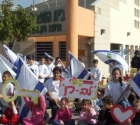 LEV-RAN SCHOOL: A LOVE STORY (new)
LEV-RAN SCHOOL: A LOVE STORY (new)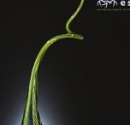 DEAR EDITOR 154
DEAR EDITOR 154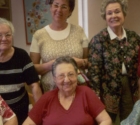 KNITTING CLUBS: TEL AVIV'S KNITTING & CROCHET SOCIAL CIRCLE
KNITTING CLUBS: TEL AVIV'S KNITTING & CROCHET SOCIAL CIRCLE Robert Kwong at the Yeshiva
Robert Kwong at the Yeshiva 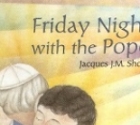 Friday Night with the Pope - A Book Review
Friday Night with the Pope - A Book Review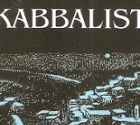 The Kabbalist - A Book Review
The Kabbalist - A Book Review  Esther Kunda
Esther Kunda